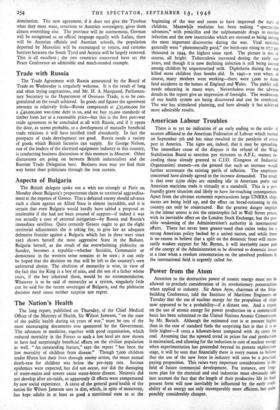The Nation's Health
The long report, published on Thursday, of the Chief Medical Officer of the Ministry of Health, Sir Wilson Jameson, " on the state of the public health during six years of war," must be one of the most encouraging documents ever sponsored by the Government. The advances in medicine, together with good organisation, which reduced mortality in the Forces to such a low level are now shown to have had surprisingly beneficial effects on the civilian population as well. " An outstanding feature," says the report " has been the low mortality of children from disease." Though 7,000 children under fifteen lost their lives through enemy action, the mean annual death-rate for children was below the pre-1939 rate. Serious epidemics were expected, but did not occur, nor did the damaging of water-mains and sewers cause water-borne disease. Neurosis did not develop after air-raids, as apparently ill effects were compensated by new social experience. A cause of the general good health of the nation Sir Wilson Jameson sees in diet, which, in spite of monotony, has kept• adults in at least as good a nutritional state as at the beginning of the war and seems to have improved the state of children. Meanwhile medicine has been making " spectacular advances," with penicillin and the sulphonamide drugs to combat infection and the new insecticides which are stressed as being among the most important discoveries during the war. Vital statistics generally were " phenomenally good," the birth-rate rising to 17.7 per thousand in 1944, the highest since 1926. The picture is not, of course, all bright. Tuberculosis increased during the early war years, and though it is now declining infection is still being caused among children by unpasteurised milk. Diphtheria during the war killed more children than bombs did. In 1942—a year when, of course, many mothers were working—there were 5,000 to 6,000 fatal accidents in the homes of England and Wales. The public still needs educating in many ways. Nevertheless even the adverse details in the report give an impression of foresight. The weaknesses of our health system are being discovered and can be combated. The war has stimulated planning, and here already it has achieved most admirable results.


























 Previous page
Previous page